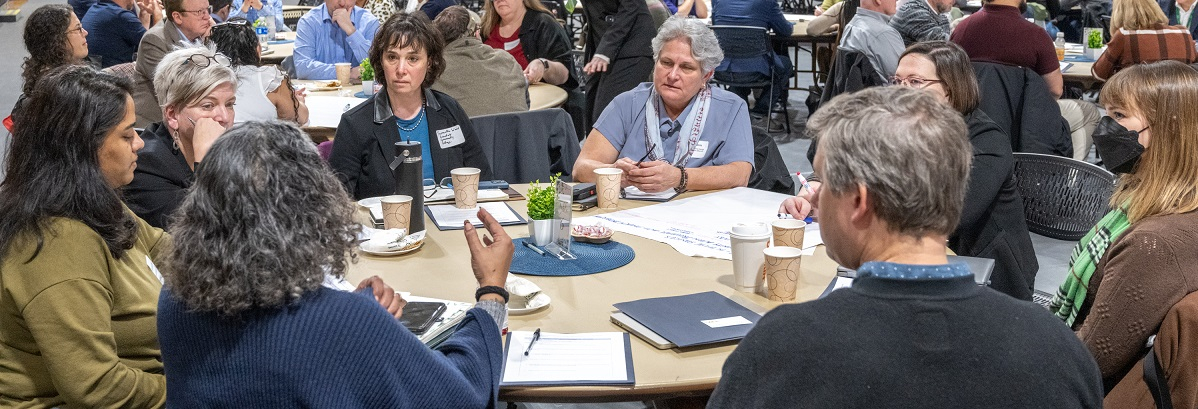
MassCEC / Workforce / Funding / Equity Workforce Planning and Capacity Grants
The Challenge: Expand equitable access to career and business opportunities in climate-critical fields
The Massachusetts clean energy workforce will need to grow by 38%, or more than 38,000 workers by 2030 to meet the state’s climate goals. Many of these jobs will be well-paying, with median wages of over $36 per hour, in 2023 dollars. A robust, well-trained, and inclusive workforce is vital to achieving and sustaining the Commonwealth’s climate goals. Organizations that deliver career awareness, training, or business support programs can ensure that Minority and Women-Owned Business Enterprises (MWBEs), fossil fuel workers, and individuals from Environmental Justice (EJ) Neighborhoods, low-income communities, or federally recognized or state-acknowledged tribes benefit from equitable access to climate-critical workforce opportunities. However, delivering such programs requires planning and resources that these organizations may not have.
About Equity Workforce Planning and Capacity Grants
Equity Workforce Planning and Capacity Grants provide up to $50,000 for up to 12 months for the development a program plan ready for implementation or up to $150,000 for up to two years for capacity building (expanding staff, solidifying essential partnerships, developing curriculum, expanding supportive services) to start or expand a clean energy equity workforce program.
In addition to direct funding, planning and capacity grantees receive technical assistance support from MassCEC to facilitate targeted networking, expanded partnerships, stronger program design, and effective practices for achieving outcomes.
Applicants may focus programming on one or more of the following categories:
- Strand A: Career Pathway Training Leading to Employment in Climate-Critical Priority Occupations
- Strand B: Clean Energy Career Awareness, Career Exploration, and Preparedness for Adult Learners and Job Seekers
- Strand C: Development of a MWBE Support Program leading to the creation or expansion of MWBEs in Climate-Critical Fields
$50,000 for Planning
$150,000 for Capacity
May 19, 2025
Funding Schedule
Applications for the Equity Workforce Planning and Capacity Grants are accepted on a rolling basis. Applications submitted by the listed priority review dates will be reviewed on a more expedited timeline.
Process Step |
Timing |
|---|---|
RFP Release |
Oct 9, 2024 |
Questions Due to MassCEC via rfpworkforce@masscec.com |
Ongoing |
Questions with Answers Posted to MassCEC Website |
Ongoing |
Pre-Application Webinar |
Oct 23, 2024 at 12 pm |
Pre-Application Office Hours |
See dates and times |
Applications Due |
Final deadline: May 19, 2025 Priority deadlines:
|
Priority Review at MassCEC |
Applications received by:
|
Interviews of Applicants (as needed) |
TBD |
Notification of Award |
Approximately 6-8 weeks after submission |
Who's Eligible
Single organizations or partnerships are eligible to apply. If multiple parties are applying jointly, one party should take on the role of Lead Applicant.
The following entities are eligible to serve as a Lead Applicant:
- Community-based entities (often referred to as community-based organizations) such as community action partnerships, environmental justice organizations, neighborhood revitalization organizations, advocacy groups, affordable housing providers, affordable housing developers, and non-profits.
- Post-secondary educational institutions, K-12 School Districts, Comprehensive and Vocational High Schools, Middle schools, and Vocational Schools offering a Career Technical Initiative evening program.
- For-profit entities such as for-profit training companies, trade associations, unions, or other coalitions of businesses and clean energy businesses.
- Federally Recognized and State-Acknowledged Tribes.
- Workforce Development Organizations, Non-Profit and For-Profit.
- Massachusetts Workforce Investment Boards and Career Centers/Mass Hire Organizations.
Applicants previously funded by MassCEC may apply so long as the proposed work is sufficiently distinct and does not lead to the same work being funded.
Applicants that have already received equity workforce planning grants may apply for a capacity grant to execute preliminary work related to future implementations.
Apply
Application Process
To apply:
- Review the Equity Workforce Training Planning and Capacity Grant Request For Proposals (RFP).
- Review all RFP forms and attachments.
- Attend MassCEC informational webinars and/or use other informational resources offered.
- Contact MassCEC with questions or to discuss your ideas via at rfpworkforce@masscec.com.
- Complete all RFP forms and attachments according to instructions.
- Submit all completed RFP forms and attachments by email to rfpworkforce@masscec.com upon completion and before 11:59 pm on May 19, 2025, with “Equity Workforce Planning/Capacity Grant Application” in the subject line.
For full Program details, please refer to the RFP.
Application Materials
Send completed application to rfpworkforce@masscec.com
Pre-Application Office Hours
MassCEC hosts a series of office hours (one-hour blocks) to answer questions about all open Workforce Development grant opportunities. Join anytime during the one-hour block!
Pre-Application Webinar
On October 23, 2024 MassCEC held a pre-application webinar for the 2025 Equity Workforce Planning and Capacity funding opportunity. The webinar addressed eligibility, budget, and the application process.
Frequently Asked Questions
- These FAQs were last updated on February 11, 2025.
- Questions are accepted and answers will be posted on a rolling basis.
- Submit questions to rfpworkforce@masscec.com.
Other Resources
MassCEC will look favorably on applications that propose data-driven approaches and leverage pre-existing resources from the robust workforce development and clean energy sectors in the Commonwealth of Massachusetts. Applicants are advised to use the following and additional resources to inform their applications:
Labor Statistics
Clean Energy Sector
Job Training & Workforce Development
Commonwealth Corporation Available Funding Opportunities
MassHire Regional Workforce Skills Planning Initiative
MassHire State Workforce Board
MA Division of Apprentice Standards
The Boston Foundation SkilWorks Project Catapult on next generation workforce development

Small Business Enterprises/MWBEs
Recent Planning & Capacity Grant Projects
Additional Funding Opportunities
EmPower Massachusetts
- $150,000 (Implementation)
- $25,000 (in some cases up to $50,000) (Innovation and Capacity Building)
March 26, 2026
Equity Workforce Training Implementation Grants
- Career Pathway Training: up to $1,200,000
- Career Preparedness: up to $400,000
- Planning or Capacity: up to $50,000 or $150,000
- December 10, 2025
- February 18, 2026
- May 1, 2026
Technical Trades Work and Learning Program for Employers
$8,640 per intern